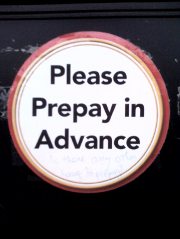|
Home
|
Dec 6, 2010
This week's themeWhat to avoid when using words This week's words pleonasm apophasis sesquipedality periphrasis paralipsis 
Photo: William Clifford
 Discuss
Discuss Feedback
Feedback RSS/XML
RSS/XML
A.Word.A.Day
with Anu GargThe French author and aviator Antoine de Saint-Exupéry once said, "A designer knows he has achieved perfection not when there is nothing left to add, but when there is nothing left to take away." The same could be said of a writer. The category of "writer" is not limited to those who write books. You are a writer if you write an office memo, a research report, a term paper, or a love letter. And when it comes to writing, you don't need a long list of dos and don'ts. If you follow only one rule, it would be: Don't write what you wouldn't want to read yourself. In this week's A.Word.A.Day we'll feature five words that describe things you may want to avoid when you put your hands on a keyboard or a quill. Contest Have you come across a pleonasm somewhere? How about making up your own examples of pleonasm? Send us your pleonasms, whether homegrown or captured in the wild (include a picture, if possible). The best entry will receive a copy of the word game WildWords (courtesy WildWords Game Company) and a runner-up will receive a copy of the word game One Up! (courtesy Uppityshirts). How to participate Email your entries to (contest at wordsmith.org) no later than Friday, Dec 10, 2010. Please include your location. Contest results Announced here. pleonasm
PRONUNCIATION:
(PLEE-uh-naz-uhm)
MEANING:
noun: The use of more words than those necessary to express an idea; redundancy.Example: free gift. ETYMOLOGY:
From Latin pleonasmus, from Greek pleonasmos, from pleonazein
(to be in excess), from pleon (more). First recorded use: 1610.
NOTES:
Pleonasm is often used for emphasis, as in free gift, true fact,
or revert back. While such repetition is discouraged, sometimes it becomes
part of the language and is used idiomatically, as in a hot water heater.
USAGE:
"Why some people walk around with a little dark cloud over their heads all
the time, while others ceaselessly view the world through rose-colored
glasses, to use a tired cliche ('tired cliche' is also a cliche, as well
as a pleonasm, but what the heck)."Otto Penzler; What a Wonderful Year!; The New York Sun; Dec 28, 2005. See more usage examples of pleonasm in Vocabulary.com's dictionary. A THOUGHT FOR TODAY:
It is easy in the world to live after the world's opinion, it is easy in solitude to live after your own; but the great man is he who, in the midst of the world, keeps with perfect sweetness the independence of solitude. -Ralph Waldo Emerson, writer and philosopher (1803-1882)
|
|
Awards | Stats | Links | Privacy Policy
Contribute | Advertise
© 1994-2026 Wordsmith